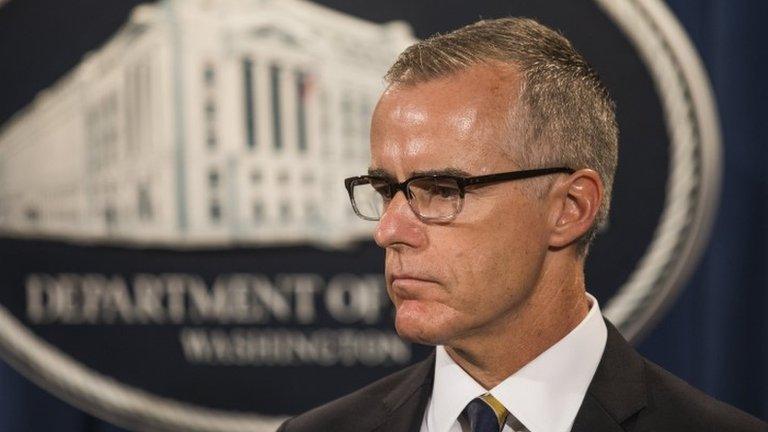US Justice Department expands probe to add 'campaign infiltration'
- Published
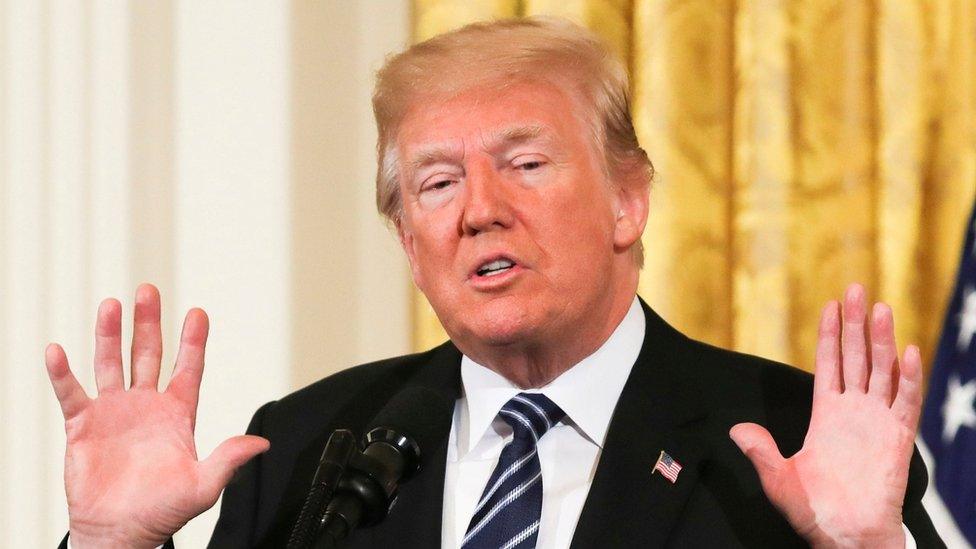
President Trump often starts his attacks - and announces political initiatives - on Twitter
The US Department of Justice says it is expanding an internal inquiry after President Donald Trump suggested the FBI "infiltrated" his 2016 campaign.
The department said on Monday it will look for any "political motivation" in its own inquiry into alleged Russian election meddling in the US.
Mr Trump later backed the move after meeting top justice and FBI officials at the White House.
He is angry that a confidential source was used during the investigation.
And he has said he wants to know whether a member of the Obama team ordered such a move, external.
But Democrats and members of the intelligence community have warned against unmasking a source because they say this puts lives at risk.
What does the new expanded probe involve?
Department of Justice spokeswoman Sarah Isgur Flores said on Monday the agency's inspector general would "expand the ongoing review" of its applications to snoop on former Trump election campaign adviser Carter Page.
The inspector general is being asked to determine "whether there was any impropriety or political motivation" on the part of US agents who conducted counter-intelligence operations of "persons suspected of involvement with the Russian agents who interfered in the 2016 presidential election".
The announcement comes after US media reports suggesting the FBI had an informant meeting campaign aides.
The deputy attorney general Rod Rosenstein said action would be taken if any infiltration was found.
"If anyone did infiltrate or surveil participants in a presidential campaign for inappropriate purposes, we need to know about it and take appropriate action," Mr Rosenstein said in a statement.
How has the White House responded?
The president met FBI Director Christopher Wray and Mr Rosenstein at the White House on Monday afternoon.
Director of National Intelligence Dan Coates was also present.
After that meeting, the White House said in a statement the Department of Justice (DoJ) had asked its inspector general to expand the investigation.
And White House Chief of Staff Kelly will set up a meeting with the FBI, DoJ, the Department of National Intelligence and congressional leaders to review "highly classified and other information they have requested".

Bomb is defused
Analysis: Anthony Zurcher, BBC North America correspondent
After meeting the president, the DoJ and FBI agreed to… exactly what they had already said they would do the previous night.
The inspector general will expand his probe into the handling of investigations during 2016 election season to include any "irregularities" involving FBI or Justice Department "tactics" - language vague enough to be essentially meaningless.
The ongoing internal review was already broadly defined, and the White House statement does not detail any of the specific allegations of misdeeds, such as "implanted" spies and FBI "infiltration", that populated the presidential Twitter feed over the past few days.
Mr Trump's Sunday outburst on Twitter threatened to breach the longstanding firewall between the White House and the Department of Justice's investigatory operations.
That particular bomb appears to have been defused - at least for now. Mr Trump's weekend outburst will probably be viewed by government officials as only the latest example of presidential frustration-venting.
Congressional representatives, with the assistance of top intelligence agency officials, will gain access to sensitive details of the FBI's investigation into Russian election meddling. In the past, secrets in the hands of Congress haven't stayed that way for long. This time may be no different.
Was there a mole inside the Trump team?
Mr Trump first made the accusation that the FBI had sent a spy into his campaign team on Friday.
Allow X content?
This article contains content provided by X. We ask for your permission before anything is loaded, as they may be using cookies and other technologies. You may want to read X’s cookie policy, external and privacy policy, external before accepting. To view this content choose ‘accept and continue’.
"It took place very early on, and long before the phony Russia Hoax became a 'hot' Fake News story," Mr Trump tweeted, adding: "If true - all time biggest political scandal!"
The New York Times followed with an article that suggested there was, indeed, an FBI informant, external - whose identity it did not reveal - who had been sent to speak to campaign aides but only after the FBI had received reports of "suspicious contacts linked to Russia".
The informant - an American academic working in the UK - had made contact with George Papadopoulos and Carter Page.
The Washington Post reported a similar account.
What's likely to happen next?
Law enforcement officials have refused to provide evidence to congressional leaders over the issue.
They have argued that doing so would put the alleged informant's life - or that of his contacts - in danger.
Mr Trump could order the US Department of Justice - which has oversight over the FBI - to release the documents.
Some Democrats are deeply unhappy.
Senator Mark Warner, who is the ranking member of the Senate Intelligence Committee, said: "Publicly outing a source risks not only their life, but the lives of every American, because when sources are burned it makes it that much harder for every part of the intelligence community to gather intelligence on those who wish to do us harm."

What is the informant's connection to Mueller?
Special Counsel Robert Mueller is looking into Russia's efforts to interfere in the 2016 US election, whether there was any collusion between the Kremlin and the Trump team and whether the president tried unlawfully to obstruct the inquiry.
According to the Washington Post, the informant has been aiding the Russia investigation since before Mr Mueller's appointment a year ago. The FBI opened the inquiry in the middle of the election campaign in July 2016.
But it remains unclear how the informant first came by the information that led to his meetings with Mr Papadopoulos and Mr Page - and his wider role as an FBI informant.
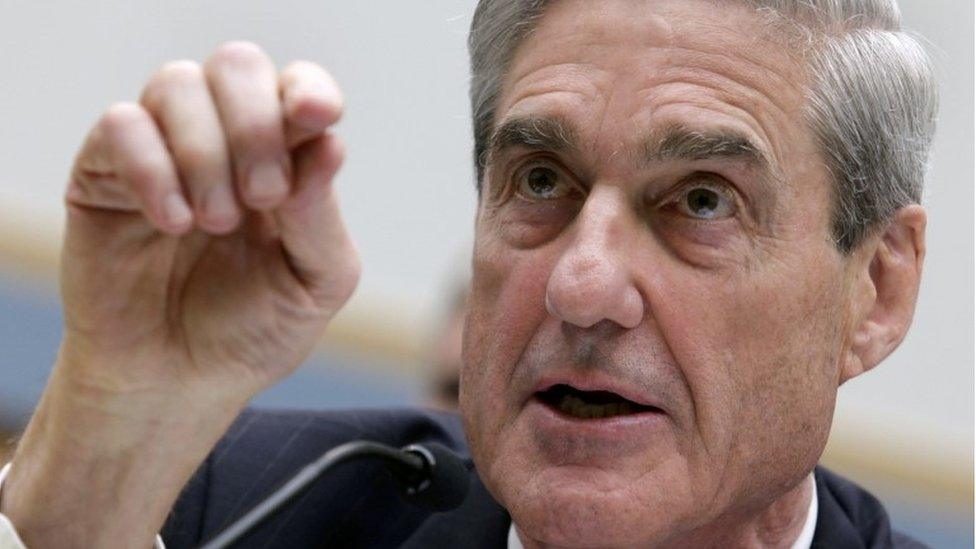
Robert Mueller has admirers on all sides of US politics
As for Mr Mueller, the former FBI head has so far charged 19 people. Mr Papadopoulos has pleaded guilty to lying to the FBI about the timing of meetings with alleged go-betweens for Russia.
But Mr Trump and his supporters have multiplied their attacks on the special counsel's work.
Without providing any evidence on Sunday, Mr Trump demanded a stop to the inquiry - that he said was nearing $20m in costs and was composed of 13 "angry and heavily conflicted Democrats". Mr Mueller is a Republican.
Allow X content?
This article contains content provided by X. We ask for your permission before anything is loaded, as they may be using cookies and other technologies. You may want to read X’s cookie policy, external and privacy policy, external before accepting. To view this content choose ‘accept and continue’.
Allow X content?
This article contains content provided by X. We ask for your permission before anything is loaded, as they may be using cookies and other technologies. You may want to read X’s cookie policy, external and privacy policy, external before accepting. To view this content choose ‘accept and continue’.
- Published18 March 2018
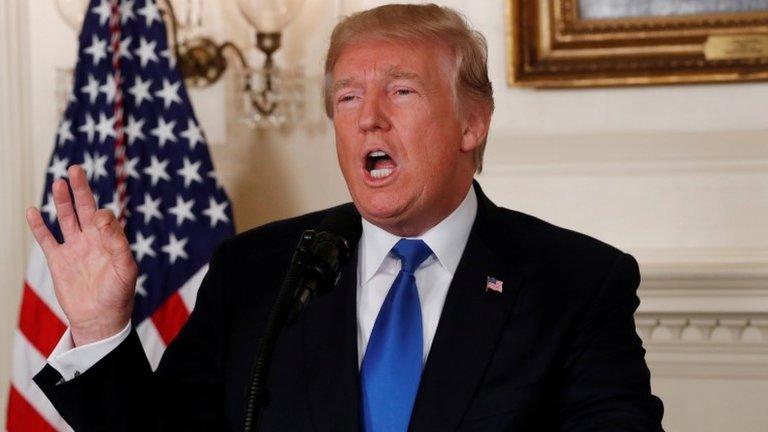
- Published2 February 2018
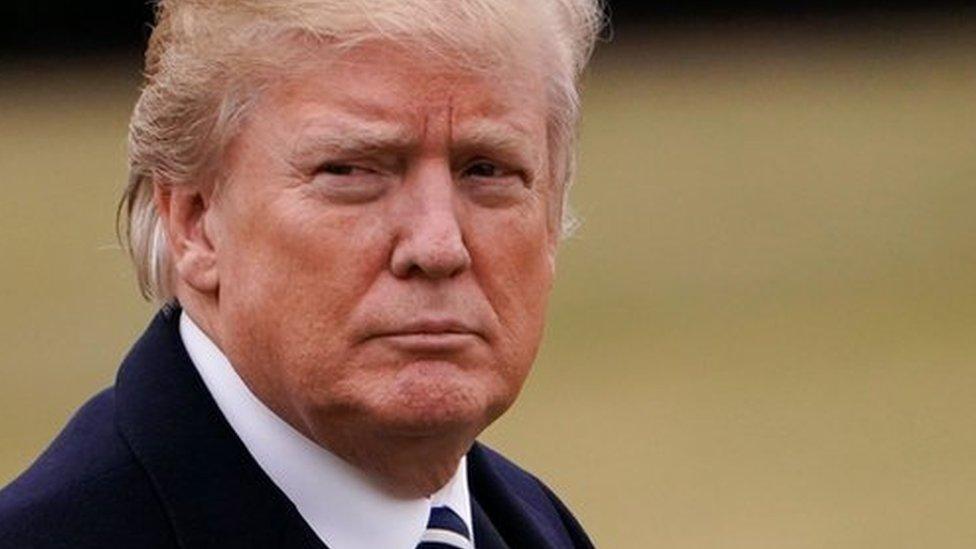
- Published24 January 2018
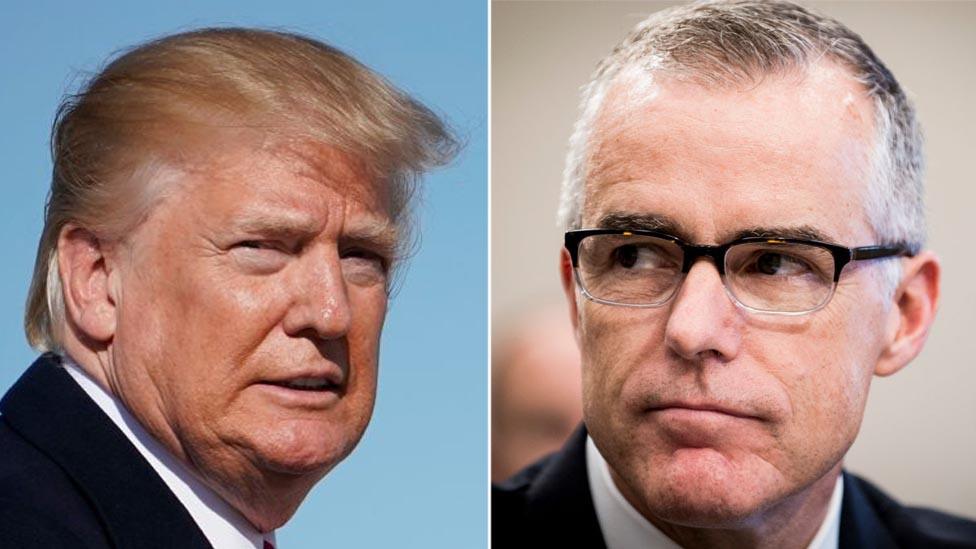
- Published18 March 2018
